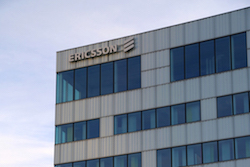Ericsson has completed an extended lab trial of LTE-based train management services, simulating railway speeds of 200 kilometres per hour.
The Swedish company joined with train manufacturer Bombardier to run 11 laboratory tests on communications-based train control (CBTC) applications on LTE networks in high-speed rail conditions.
CBTC systems enable railway operators to manage and protect trains on the network more safely and efficiently, providing more accurate positioning of trains.
They also require less wayside equipment and have built-in redundancy features, so operators can make better use of tracks and trains when responding to demand.
Ericsson and Bombardier also tested LTE-based applications for closed-circuit television (CCTV), voice services, platform information, advertising and Wi-Fi for passengers.
In the tests, the LTE networks achieved uplink and downlink latencies far below the threshold of 100 milliseconds and packet losses approaching zero, considerably below the 0.5 percent pass mark.
Charlotta Sund, Head of Customer Group Industry and Society at Ericsson, said: “We will continue to test a variety of modems to ensure we can provide robust LTE networks for rail applications.
“We aim to develop solutions that ensure enhanced rail safety through CBTC and CCTV, as well as enhanced entertainment for passengers through services such as voice, platform information, advertising and Wi-Fi.”
Last year, Alstom became the first transport company to integrate LTE into its signalling system solution, based on CBTC standards.
The solution, delivered by Huawei, provides a ground-to-train wireless network for train operators.
Meanwhile, Ericsson has signed a 10-year deal with Wasps Holdings, owner of the Ricoh Arena stadium in Coventry, England, to provide Wi-Fi to the venue based on the small-cells-as-a-service (SCaaS) model.
Ericsson will design and build the network, and manage it on behalf of Wasps Holdings.
The 32,609-seater Ricoh Arena includes 20,000 square meters of events space and a 121-bedroom hotel.
Ericsson will also develop an app, based on its Networked Event platform, that will provide visitors with location-specific news, information and services.
Valter D’Avino, Head of Western and Central Europe at Ericsson, said: “SCaaS is the most efficient, cost-effective means of enhancing connectivity in stadiums.
“Wasps has become the first rugby club to take advantage of Small Cell as a Service, and we have some very exciting ideas about how to evolve our new partnership in the years to come by introducing other innovative solutions from our portfolio.”
Ericsson boosted LTE coverage at all 10 stadiums hosting the Euro 2016 football tournament in France.



